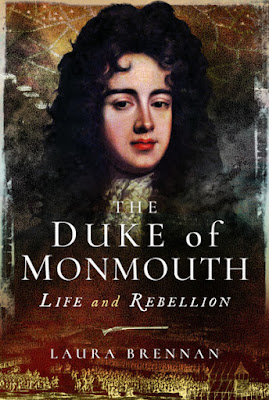Opening Page
Monmouth Rebellion 1685
The purpose of the blog is to look at how the life of the Duke of Monmouth and the Monmouth Rebellion of 1685 have been portrayed in literature, fiction, art, drama, poetry, So the emphasis is on imagined history. The above image is taken from Wikipedia quite deliberately and reproduced with thanks. It is in fact book illustration From p. 380 of the 1873 book British Battles on Land and Sea, volume 1 by James Grant. And depicts Monmouth's landing at Lyme Regis on the 11th June 1685.
To take a more contemporary account from the Diary of John Evelyn
" 14th June, 1685. There was now certain intelligence of the Duke of Monmouth landing at Lyme, in Dorset[Pg 225]shire, and of his having set up his standard as King of England. I pray God deliver us from the confusion which these beginnings threaten!
Such a dearth for want of rain was never in my memory.
17th June, 1685. The Duke landed with but 150 men; but the whole kingdom was alarmed, fearing that the disaffected would join them, many of the trained bands flocking to him. At his landing, he published a Declaration, charging his Majesty with usurpation and several horrid crimes, on pretense of his own title, and offering to call a free Parliament. This declaration was ordered to be burnt by the hangman, the Duke proclaimed a traitor, and a reward of £5,000 to any who should kill him."
Of course with diary writing, we can't always assume that the actual entries were in fact written on the day they appear in the text. John Evelyn probably would not have heard of the landing at Lyme on 14th June itself. Monmouth did not in fact proclaim himself king until 21st June 1685, shortly after he arrived in Taunton . Evelyn was essentially conservative, in this passage he fears the 'disaffected', the fear of soldiers from 'trained bands' , presumably the local militia joining the rebellion, the fear of 'confusion' , overall disorder.
And part of the remit is this blog is not just to look at the texts and images of the people Patti Smith would call as being 'high on rebellion'. But to see work of people who viewed Monmouth as a threat.
To take an extract from the novel 'Random Army' Madaleine Pollard ( 1969)
"On the narrow strip of stones between high water and cliff, out of sight of the crowd waiting in the meadow and the top, James Duke of Monmouth had come into Somerset ( sic) . .....the Duke knelt some minutes on the stony beach in prayer, while in the evening breeze his lifted standard fluttered open above his head. Deep green, and in letters of gold, the words he hoped would take him to London and his uncle's crown, 'Fear nothing but God'.
A fascinating contrast to the picture above.
Michael Bully
11th June 2021 .
A number of the posts on this blog have already been published on the blog A Burnt Ship which is devoted 17th century warfare and related literature and fiction.
Future posts here will be new material
Contact Michael Bully
A Burnt Ship @ Shipburnt
MonmouthRebellion1685@outlook.com



Comments
Post a Comment